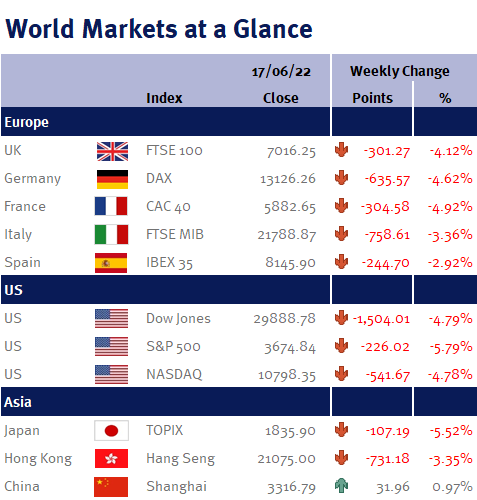While it pains us to admit, this may actually be a sensible move given food and fuel are high frequency purchases and as such, we can all (not just Americans) see and feel the effects of the price rises. Although higher food and energy prices are a result of the war in Ukraine (dubbed ‘Putinflation’) and is not something that Fed policymakers can control with higher interest rates, the Fed needs to ensure that long-term inflation expectations don’t become unanchored – especially as US news headlines are focusing on the fact that petrol prices have gone above $5 per gallon (likewise, UK news headlines are now focusing on the fact that it now costs £100 to fill-up a typical car as the price approaches £2 per litre).
Furthermore, the Fed chair, Jay Powell, did state that the long-term neutral rate is still around 2%, which suggests to us that this week’s aggressive increase was simply to shock and awe the market and in doing so leave the Fed in a better position to potentially slow or stop interest rate increases earlier than previously expected – especially as US economic data released this week clearly shows that previous US interest rate increases are already impacting demand. For example, retail sales declined 0.3% in May; housing starts fell 14.4%; and the Philadelphia Fed Business Outlook Survey not only showed current conditions have contracted, but expectations for the next six months were at levels consistent with previous recessions.
Unsurprisingly, shares in consumer discretionary companies (for example retailers, travel and leisure, etc) have been among the worst performers this week. For example, Carnival Corporation (a US operator of cruise ships which also has its shares listed on the UK equity market) has seen its shares fall 17.89% this week – taking its shares back to the levels they fell to at the start of the coronavirus outbreak and lockdown. Likewise, Caesars Entertainment (the hotel and casino operator) has seen its shares fall nearly 13% this week and is now down 68.5% since its peak last October, while Wayfair (the online furniture retailer) is down nearly 90% from its peak last year.
It was a similar story in the UK: despite recent GDP data which clearly shows that the UK economy is starting to shrink, BoE policymakers focused on the rising headline CPI inflation rate and increased interest rates by a further 0.25%. Interestingly, 3 of the 9 policymakers voted to increase interest rates by 0.5%, which suggests that UK interest rates may again increase at the next meeting on 4 August 2022.
In Japan, the BoJ left its policy unchanged. Although this appears at odds with other central banks, a sustained breach of its inflation target seems unlikely given its weak economy coupled with the fact that its employment market is not tight enough to see any sort of wage growth spiral.
Looking ahead to this coming week, US markets are closed on Monday (20 June 2022) for Juneteenth. Data wise we have UK & Japanese CPI inflation; UK retail sales; US mortgage applications; Eurozone consumer confidence; US, UK, Eurozone & Japanese PMI; University of Michigan Consumer Sentiment.
Investment Management Team


